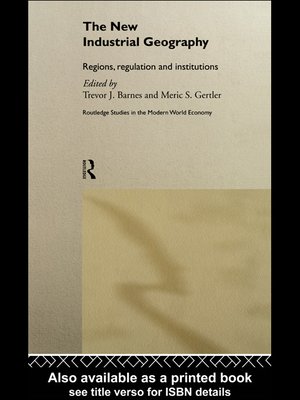The New Industrial Geography
ebook ∣ Regions, Regulation and Institutions · Routledge Studies in the Modern World Economy
By Trevor J. Barnes

Sign up to save your library
With an OverDrive account, you can save your favorite libraries for at-a-glance information about availability. Find out more about OverDrive accounts.
Find this title in Libby, the library reading app by OverDrive.



Search for a digital library with this title
Title found at these libraries:
| Library Name | Distance |
|---|---|
| Loading... |
Over the last twenty years the economies of North America and Western Europe have undergone massive industrial-geographical transformations. The New Industrial Geography focuses on three of the most important: on the heightened importance of the region as a generator of both technological innovation and economic wealth; on the contingent effects of new local, national and international forms of regulation; and on the emergence of new institutions, and the reworking of old ones.
Drawing on the theoretical resources of institutional economics, The New Industrial Geography opens new perspectives in economic geography. In its focus on historical and geographical context, institutional embeddedness, and tacit rules and formal regulations, institutional economics is shown to be the perfect basis for understanding the profound economic and geographical changes of the last two decades, and on which also to build a new kind of industrial geography. Issues covered include: the retheorization of the geography of industrial districts; the analysis of institutional 'thickness', and the economic-geographical effects of institutional rigidity and sclerosis; the economic-geographical consequences of new regulatory bodies and policies; and the geographically situated character of institutions and regulatory frameworks, and the effects of separating them from their originating context; the development of new strategies for achieving more equitable forms of regional development.
This interdisciplinary volume brings together some of the most prominent scholars writing on the topic of contemporary industrial and economic geographical change. They are Ash Amin, Trevor Barnes, John Britton, Susan Christopherson, Philip Cooke, Richard Florida, Meric Gertler, Roger Hayter, John Holmes, Ann Markusen, Kevin Morgan, Mark Samber, Erica Shoenberger, Michael Storper, Nigel Thrift and David Wolfe. It will be of interest to students and researchers of economic and industrial geography, industrial and regional economics, political science, industrial sociology and urban and planning studies.
Drawing on the theoretical resources of institutional economics, The New Industrial Geography opens new perspectives in economic geography. In its focus on historical and geographical context, institutional embeddedness, and tacit rules and formal regulations, institutional economics is shown to be the perfect basis for understanding the profound economic and geographical changes of the last two decades, and on which also to build a new kind of industrial geography. Issues covered include: the retheorization of the geography of industrial districts; the analysis of institutional 'thickness', and the economic-geographical effects of institutional rigidity and sclerosis; the economic-geographical consequences of new regulatory bodies and policies; and the geographically situated character of institutions and regulatory frameworks, and the effects of separating them from their originating context; the development of new strategies for achieving more equitable forms of regional development.
This interdisciplinary volume brings together some of the most prominent scholars writing on the topic of contemporary industrial and economic geographical change. They are Ash Amin, Trevor Barnes, John Britton, Susan Christopherson, Philip Cooke, Richard Florida, Meric Gertler, Roger Hayter, John Holmes, Ann Markusen, Kevin Morgan, Mark Samber, Erica Shoenberger, Michael Storper, Nigel Thrift and David Wolfe. It will be of interest to students and researchers of economic and industrial geography, industrial and regional economics, political science, industrial sociology and urban and planning studies.







